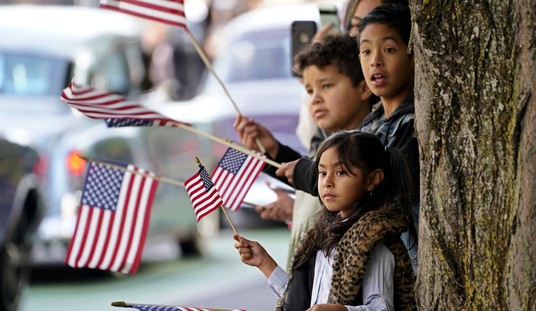The decision got overlooked in all of the attention to Barack Obama’s press conference, but nonetheless this will make some big news. The Sixth Circuit has denied an appeal by the Thomas More Law Center and a group of individuals whose challenge to the ObamaCare mandate lost at the district-court level. In a split decision, the panel upheld the individual mandate as falling within the power of Congress to regulate interstate commerce, and ruled that the Constitution does not forbid regulation of “inactivity”.
The conclusion sums up the decision, in which the panel accepted the government position entirely:
Virtually everyone will need health care services at some point, including, in the aggregate, those without health insurance. Even dramatic attempts to protect one’s health and minimize the need for health care will not always be successful, and the health care market is characterized by unpredictable and unavoidable needs for care. The ubiquity and unpredictability of the need for medical care is born out by the statistics. More than eighty percent of adults nationwide visited a doctor or other health care professional one or more times in 2009. Centers for Disease Control and Prevention National Center for Health Statistics, Summary Health Statistics for U.S. Adults: National Health Interview Survey, 2009, table 35 (2010). Additionally, individuals receive health care services regardless of whether they can afford the treatment. The obligation to provide treatment regardless of ability to pay is imposed by the Emergency Medical Treatment and Active Labor Act, 42 U.S.C. § 1395dd, state laws, and many institutions’ charitable missions. The unavoidable need for health care coupled with the obligation to provide treatment make it virtually certain that all individuals will require and receive health care at some point. Thus, although there is no firm, constitutional bar that prohibits Congress from placing regulations on what could be described as inactivity, even if there were it would not impact this case due to the unique aspects of health care that make all individuals active in this market.
In light of the conclusion that the minimum coverage provision is a valid exercise of Congress’s power under the Commerce Clause, it is not necessary to resolve whether the provision could also be sustained as a proper exercise of Congress’s power to tax and spend under the General Welfare Clause, U.S. Const. Art. I, § 8, cl. 1.
V. CONCLUSION
Congress had a rational basis for concluding that, in the aggregate, the practice of self-insuring for the cost of health care substantially affects interstate commerce. Furthermore, Congress had a rational basis for concluding that the minimum coverage provision is essential to the Affordable Care Act’s larger reforms to the national markets in health care delivery and health insurance. Finally, the provision regulates active
participation in the health care market, and in any case, the Constitution imposes no categorical bar on regulating inactivity. Thus, the minimum coverage provision is a valid exercise of Congress’s authority under the Commerce Clause, and the decision of the district court is AFFIRMED.
Judge Graham’s dissent also falls along predictable lines:
If Congress exceeded its authority by enacting the mandate, then the mandate is “legally stillborn” and cannot be valid in any application. Virginia v. Sebelius, 728F.Supp.2d 768, 774 (E.D. Va. 2010). “There is no position which depends on clearer principles, than that every act of a delegated authority, contrary to the tenor of the commission under which it is exercised, is void. No legislative act, therefore, contrary to the Constitution can be valid.” The Federalist No. 78 (A. Hamilton). As cases in point, Lopez and Morrison struck down statutes as facially unconstitutional under the Commerce Clause and did so without reference to Salerno. United States v. Lopez, 514 U.S. 549 (1995); United States v. Morrison, 529 U.S. 598 (2000). …
If the exercise of power is allowed and the mandate upheld, it is difficult to see what the limits on Congress’s Commerce Clause authority would be. What aspect of human activity would escape federal power? The ultimate issue in this case is this: Does the notion of federalism still have vitality? To approve the exercise of power would arm Congress with the authority to force individuals to do whatever it sees fit (within boundaries like the First Amendment and Due Process Clause), as long as the regulation concerns an activity or decision that, when aggregated, can be said to have some loose, but-for type of economic connection, which nearly all human activity does. See Lopez, 514 U.S. at 565 (“[D]epending on the level of generality, any activity can be looked upon as commercial.”). Such a power feels very much like the general police power that the Tenth Amendment reserves to the States and the people. A structural shift of that magnitude can be accomplished legitimately only through constitutional amendment.
That question may have more resonance for the case brought by the states. The question of standing didn’t prevail in Thomas More Law Center v Obama, but neither did any of the plaintiffs represent sovereign states, either. The question of federal usurpation of power will matter more in the context of Virginia v Sebelius and the multi-state case originating in Florida.
However, this will give the Obama administration some political breathing room until those two cases get to the appellate court. This is just one more stop along the road anyway, as this won’t get resolved until the Supreme Court decides to combine the cases and make a final ruling.
Update: Jonathan Adler at the Volokh Conspiracy notes that the court did reject the tax argument for the mandate, which keeps the batting average for that White House argument at .000. (via Aaron Worthing)








Join the conversation as a VIP Member